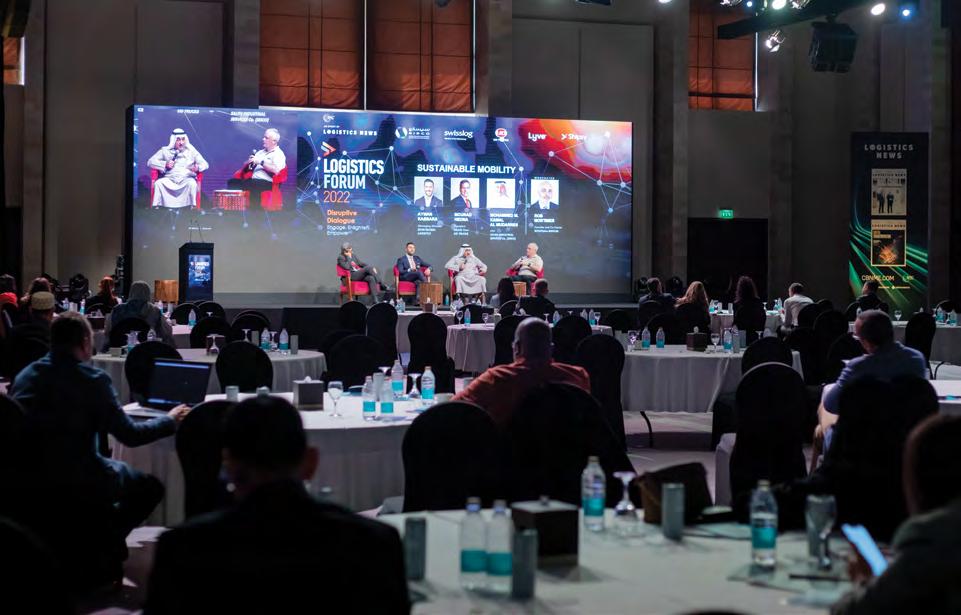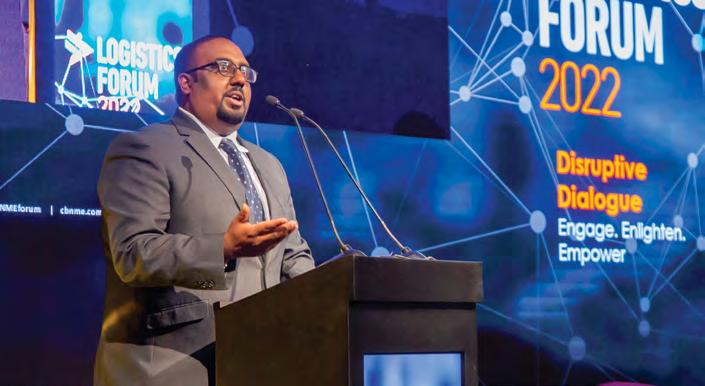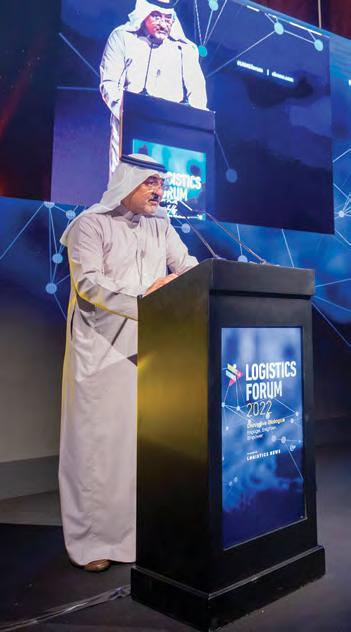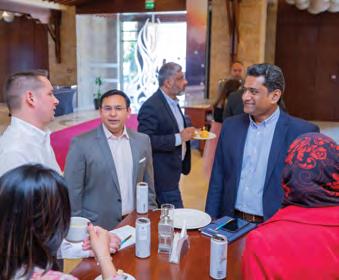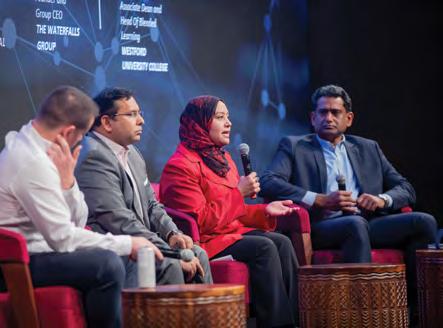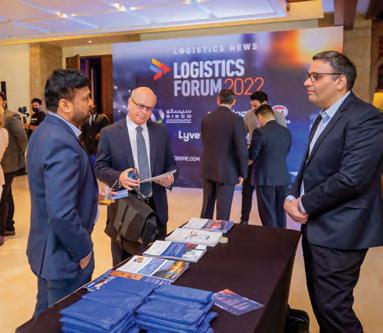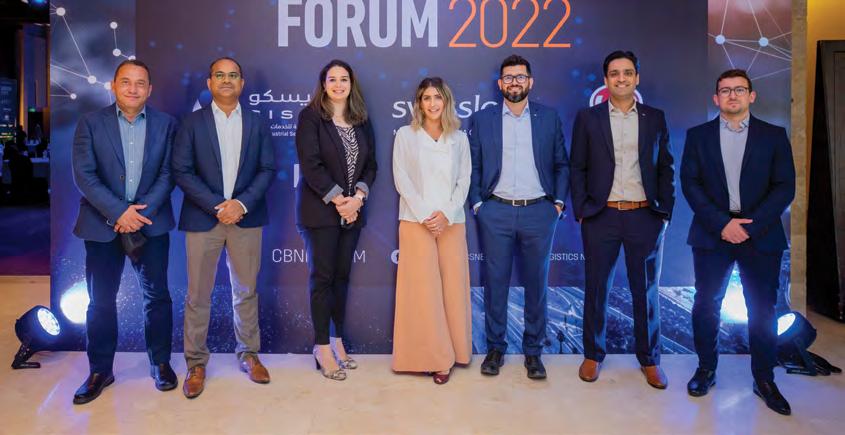
25 minute read
INTERVIEW
Julian Maynard, Managing Director, Maynard Design
A FORMIDABLE PARTNERSHIP
Advertisement
Maynard Design recently acquired Transport Design Consultancy, the firm behind the Riyadh and Dubai Metros as well as the Abu Dhabi city street signage. We speak to Julian Maynard, Managing Director, Maynard Design to learn more about the acquisition and what this means for transport design in the region “Once we realised how well we work together, we thought it’d be a natural fit to combine our experience of wayfinding branding and product design together to offer our clients a truly worldwide service and experience.”
In March, Maynard Group has announced the acquisition of Transport Design Consultancy (TDC), a move to build a leading international transport design practice across the globe. With this merger, Maynard Design Group has become the most experienced multi-disciplinary design consultancy in the transport sector with over 400 projects delivered in 17 countries combined over the last 20 years, positively impacting over 3.5 billion journeys taken by people every year.
“Tony Howard [founder of TDC] and I have known each other for over 25 years and have worked together on several projects including the Ashford International Railway Station in the UK,” Julian reveals.
“We also worked on projects in Australia and New Zealand. Once we realised how well we work together, we thought it’d be a natural fit to combine our experience of wayfinding branding and product design together to offer our clients a truly worldwide service and experience.”
Combined, the group offers services in branding, wayfinding and product design for the transport, aviation, public realm, culture, education, healthcare, commercial and residential sectors in the UK and Europe, as well as the Middle East, India, and Australasia.
He adds: “Acquiring TDC is a huge step towards our ambition of offering our expert and technical services globally. Our focus on the interaction of people, places, and products together
with our locations of the UK, Australia and New Zealand fits naturally together with TDC’s transport and wayfinding expertise and long-standing client relationships in the Middle East and Asia.
“Our shared values of collaboration, commitment and passion for detail and extensive wealth of technical skills and track record mean that, going forward, clients will benefit from a deeper level of understanding and experience coupled with a more comprehensive global reach. We are currently reviewing opportunities to expand into North America and Canada to offer clients our multidisciplinary and global expertise in transport.” With the merger complete, Julian is bidding on larger projects with a wider focus in the Middle East and Asia. He notes: “We’re looking at opportunities in Saudi Arabia and India, as well as biometric projects in mass transit.”
Localisation and culture Maynard Design hopes to get a local team onboard to handle operations in the region. Julian is of the option that localisation in wayfinding is vital. “There is so much requirement for infrastructure around the world. It’s essential to understand the local culture and the needs of those users and working environments in those countries.” He adds: “And that’s why we try to work with people who are maybe from that country, or have direct experience of working in those environments, because I think people are more invested in the project if it’s their home city.”
Wayfinding design complexities Speaking about complexities of wayfinding design for mass transit systems, Julian shares that the scale of public transport infrastructure has evolved to include multiple modes of transport in a single hub. He explains: Transportation hubs have gotten larger over years. It’s because of good planning. We no longer have a train station here, a bus station there, a metro and a cycle way or ferry line down the road. We’re now combing all these hubs into one at a central location which is accessible to all.”
Transport authorities are now focusing on giving people multiple modes of transportation to choose from at a single location. He adds: “Connectivity is so important for the future sustainability of cities. Governments are trying to get people out of their cars and make the travel experience in public transport as convenient as possible.”
This makes wayfinding design even more complex and critical to the success of mass transit systems. If the signage is not simple and clear enough for people to find their way, they
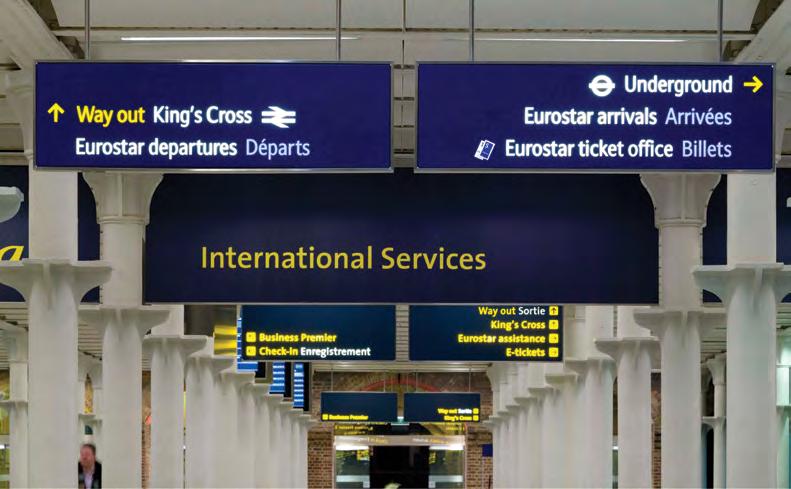
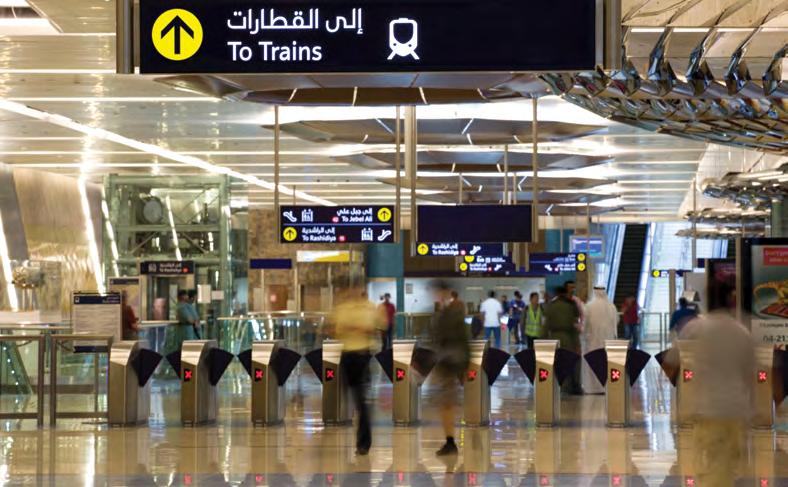
won’t use public transport. Which is why understanding customer passenger experience throughout their journey, is important to Maynard Design.
“What we do is we try and look at the touch points. Is it the ticketing? Is it a family with prams trying find a lift to get down to platform level? It’s all the of those different user groups that we have to understand when we’re designing a wayfinding system and designing products and interactions,” Julian explains.
Wayfinding is just not about signs, he remarks. “Signs are just one part of it. Playing with environments or graphics, one’s understanding, and working with the architectural design teams on understanding that space is also wayfinding. We look into transforming a space, bringing in natural light so people can see the signs and the paths they want to take right away.”
“Lighting is a crucial element of wayfinding,” says Julian. “People need to see where the elevators and escalators “SIGNS ARE JUST ONE PART OF IT. LAYING WITH ENVIRONMENTS OR GRAPHICS, ONE’S UNDERSTANDING, AND WORKING WITH THE ARCHITECTURAL DESIGN TEAMS ON UNDERSTANDING THAT SPACE IS ALSO WAYFINDING.”
are. There’s a lot of different elements, which enables people to navigate through buildings. It’s not just about signs,” he reiterates.
Planet first On the topic of sustainability, the company’s strength in designing global transportation networks saves millions of carbon emissions yearly.
With its work in Dubai alone, through reduced car journeys the company has helped to save over 900,000 litres of fuel per day.
Julian concludes: “Between us we have a huge heritage and track record, but we are also constantly innovating and significantly contributing to sustainability programmes. After all, the projects we work on span several years, and then once delivered need to last several decades.
“As such we are directly impacting billions of people who move through the places we have helped to design. These people will never fully know the energy and commitment we have invested in such projects to make their experience the best it can possibly be - but they are the core focus of ours from day one. With the Maynard and TDC teams coming together and by adding further insight and expertise as we continue to grow, we can go on steering the sector into the future and, in doing so, further enrich the lives of people, the journeys they take and the places they interact with.”
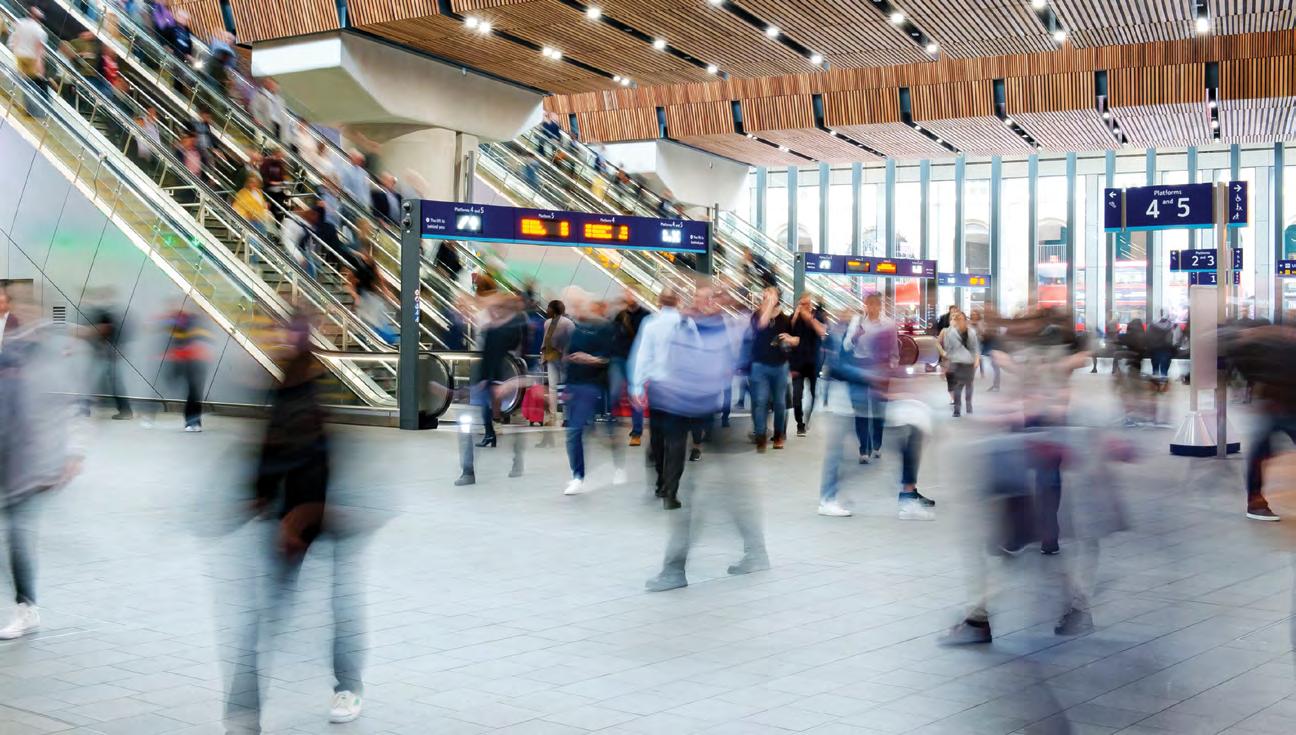
GOLD PARTNER ASSOCIATE PARTNER TRANSPORTATION PARTNER
THE RECAP LOGISTICS FORUM
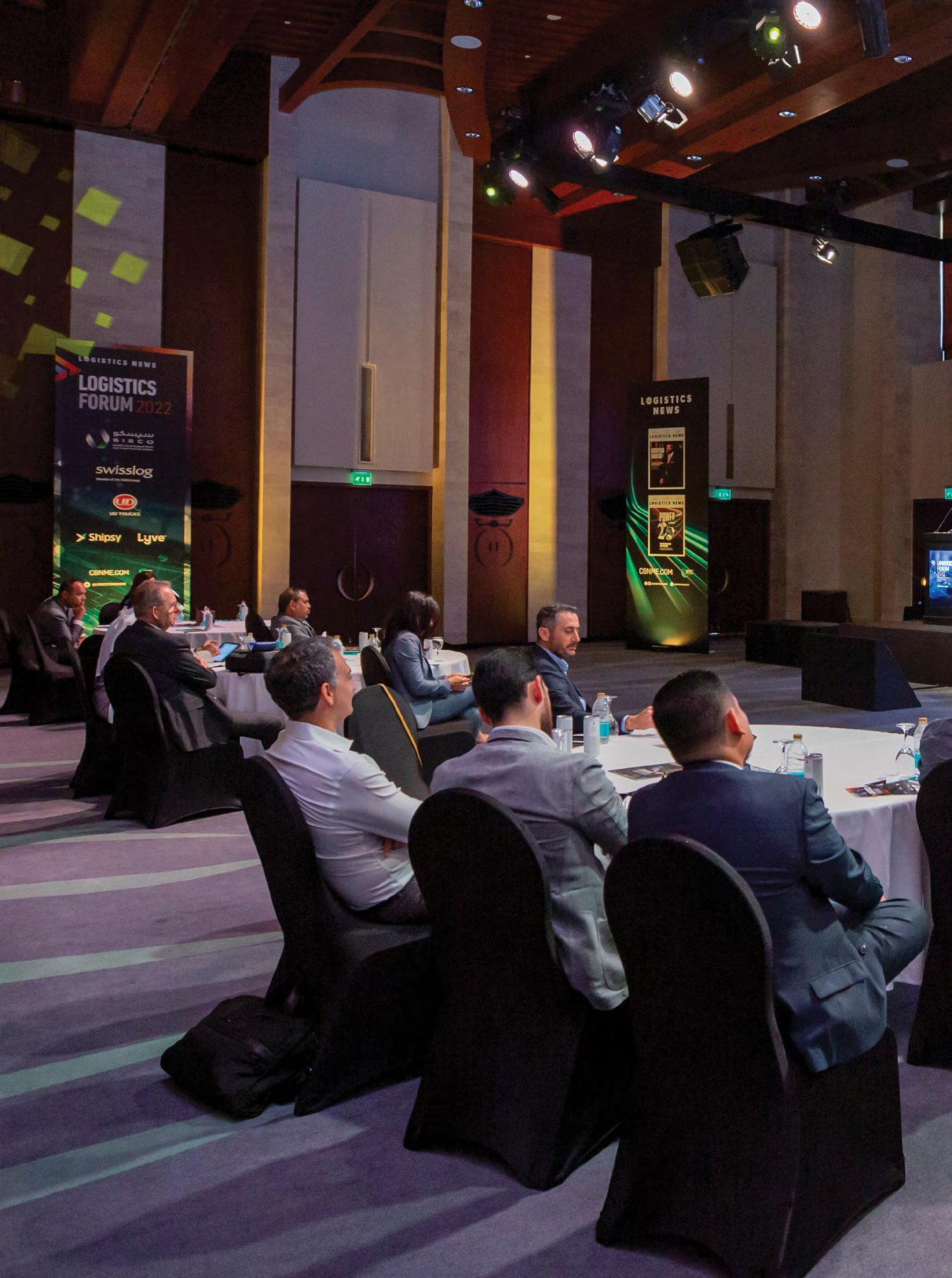
TECHNOLOGY PARTNER ASSOCIATE PARTNER
The Logistics News ME Forum 2022 which took place on 29 March at Sofitel Dubai The Palm saw 170 guests in attendance and 17 speakers participate in interactive and informative sessions

Logistics, as a whole, is undergoing a metamorphosis – moving away from manual processes to digitalisation. While the transformation was slow moving, the pandemic accelerated the process and today we’re witnessing a digitally empowered industry. The pandemic was a catalyst that unveiled how vital logistics is. Lifesaving medicines, vaccines and food was able to reach people thanks to logistics. However, this disruption, caused by the pandemic, has created some positive and not so positive results for the industry. The Logistics Forum highlighted topics such as 10-minute deliveries, supply chain crunch, sustainability, automation in warehousing and digital logistics. It also presented an opportunity for the attendees to get acquainted with facts and engage in challenging conversations with speakers and fellow attendees.
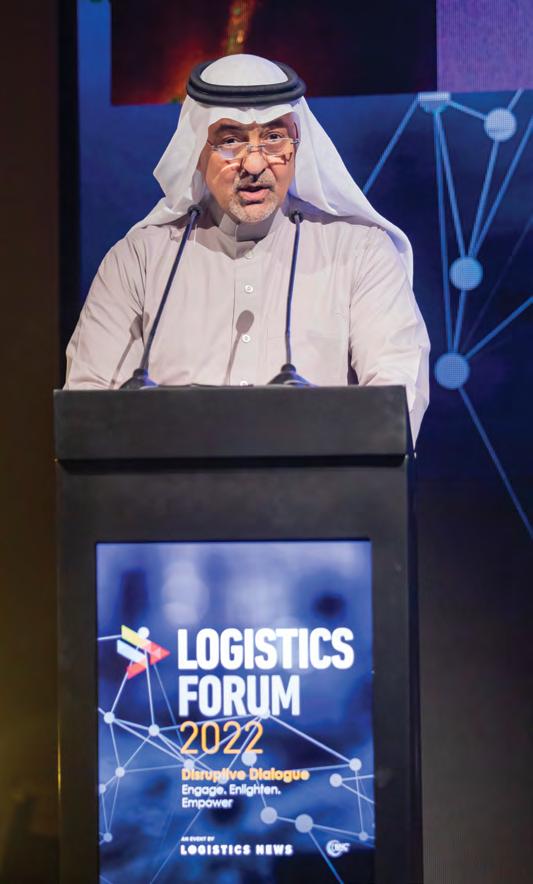
A TECHNOLOGY DRIVEN FUTURE
A WORD FROM OUR KEYNOTE SPEAKER, MOHAMMED AL-MUDARRES, CEO, SAUDI INDUSTRIAL SERVICES CO
Logistics can be traced all the way back to the Greek and Roman empires, but it has undergone several major transformations as new technologies provide opportunities to manage the movement and storage of goods more efficiently. In the digital transformation age, logistics is once again undergoing a major shift. This shift has been intensified due of the pandemic and a global rethink of international supply chains. Logistics technologies such as robotic warehouse systems make automation a reality, while drones improve last mile delivery capabilities, and better tracking tools such as RFID tags improve visibility throughout the supply chain.
Furthermore, technology innovations are making big waves across industries, and logistics and the supply chain may be one of the most impacted sectors. Notorious for its heavy use of manual processes and large amounts of data stored in different ways and in different places, the logistics industry has perhaps the most to gain from implementing new technologies and following the most innovative supply chain and logistics technology trends.
As the world progresses, the top 10 technologies influencing the logistics industry are Internet of Things, artificial intelligence, robotics, last mile delivery solutions, warehouse automation, blockchain, big data and analytics, cloud computing, autonomous vehicles (AVs), and lastly elastic logistics.
With customer expectations continuously on the rise and as interests shift towards product variety and personalized services, the logistics and supply chain sectors face mounting pressures. Moreover, advancements in emerging technologies, result in companies struggling to choose the most suitable technologies to invest in. As technology progress continues, it is important for companies to be proactive and identify potentially disruptive changes at an early stage.
The need for inventory management and control is another area that will continue to expand to achieve the goal supply chain security for industries and governments. As the sector looks to sustainable solutions the need to develop solutions that protect the environment will become more and more necessary. The opportunities are almost endless as logistics moves into an exciting new phase in its growth and development in meeting.
As a strategic developer and investor in key infrastructure sectors, namely, ports and container terminals, logistics and industrial services, and water solutions, we at Saudi Industrial Services Co (SISCO), are deeply invested in the future of logistics.
We developed the first private sector bonded and reexport zone in Saudi Arabia. It was set up within the vicinity of Jeddah Port with a one million sqm of land providing both warehouses and open yard storage, serving key customers such as Amazon, Aramex, Unilever, and several regional and global key clients. Currently, we are in the process of developing an additional 600 sqm property as a special logistic hub in the city of Jeddah.
PANEL 1 | INNOVATION IN TECHNOLOGY
The logistics sector is undergoing a transformation with technology playing a crucial role. We look at how various technologies - blockchain, artificial intelligence, machine learning, big data & data analytics, automated solutions - are reshaping the industry to make it leaner and efficient.
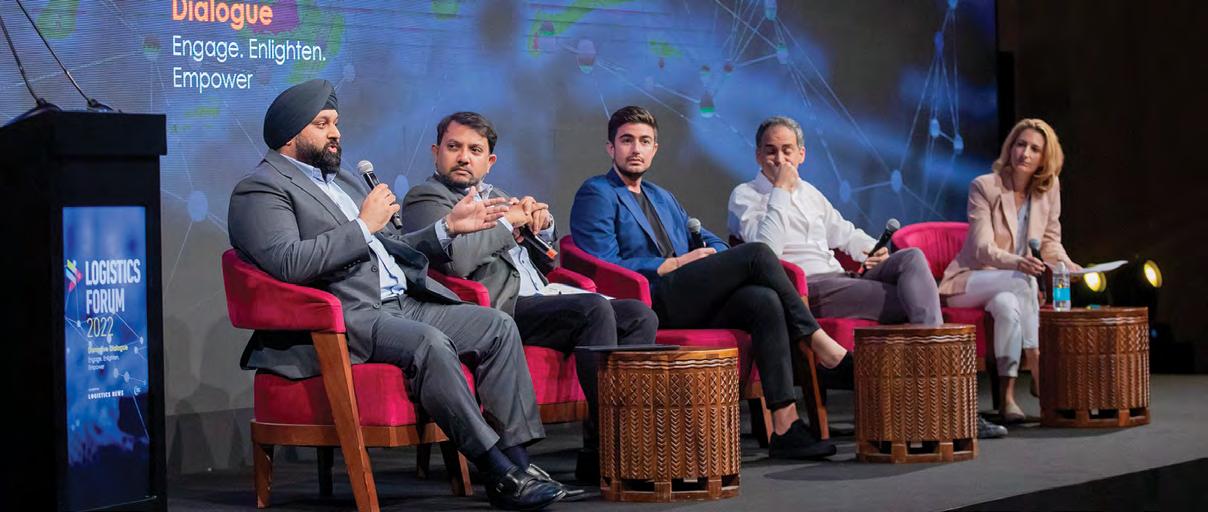
“The Logistics Forum at the Sofitel Dubai The Palm was an informative session. Participating and listening to other innovative, tech-driven organisations on how innovation is driving logistics forward was very insightful. Each panel member brought their own thoughts to the table and together we delivered the panel of the day. We spoke about the acceleration of innovation in logistics due to the pandemic, how we service different industries, and most importantly, how only by working together, we will be able to drive logistics forward. Look forward to the next one.”
ADEL HAMWI, CO-FOUNDER & CEO, PALLETPAL
“Logistics and supply chain are highly complex operations that have been behind the eight-ball when compared to the expectations of customer demand which is fuelled by the digitisation of the retail and parcel world. Through the pandemic a lot of the weaknesses of our (logistic and supply chain) ecosystem was exposed and that expedited the digitisation of it to address customer demand and to build scalability and resilience to cater to the needs of tomorrow. “As we keep making advancements and developing better systems, operations, and experiences for the customer, we are looking into adopting the next generation of digitisation through blockchain and other AI, hardware, mobility applications. Through consistent engagement with our customers, regulators, and internal employees we see us on the forefront of developing and deploying the systems and processes across our ecosystem.”
ANGAD SINGH, GLOBAL DIRECTOR – INNOVATION, ARAMEX
“Supply chain is one of the most complicated endeavours humans have ever engaged in and it takes place millions of times a day and affects everyone of us. As a provider of Robotic Process Automation (RPA) for Logistics, one needs to have the in-depth domain knowledge to create value and integrate with legacy industries such as logistics and supply chains. Having said that, I see logistics and distribution players catching up fast with the demand for software automation and other cutting-edge technology. The attention and budget allocation the above topic gets at C-Level, helps to encourage skilled tech players to come up with new solutions, and the drive for full digitisation. “Harnessing a combination of technologies like AI, machine learning, and predictive analytics allows companies to automate processes from rate inquiries over order creations to invoicing and improve partner relationships to create frictionless customer experiences that increase satisfaction and boost sales.”
CAROLIN-CARMEN NEUBAUER, CHIEF OPERATING OFFICER, FERO AI
Adel Hamwi
Co-Founder & CEO PalletPal
Angad Singh
Global Director – Innovation Aramex
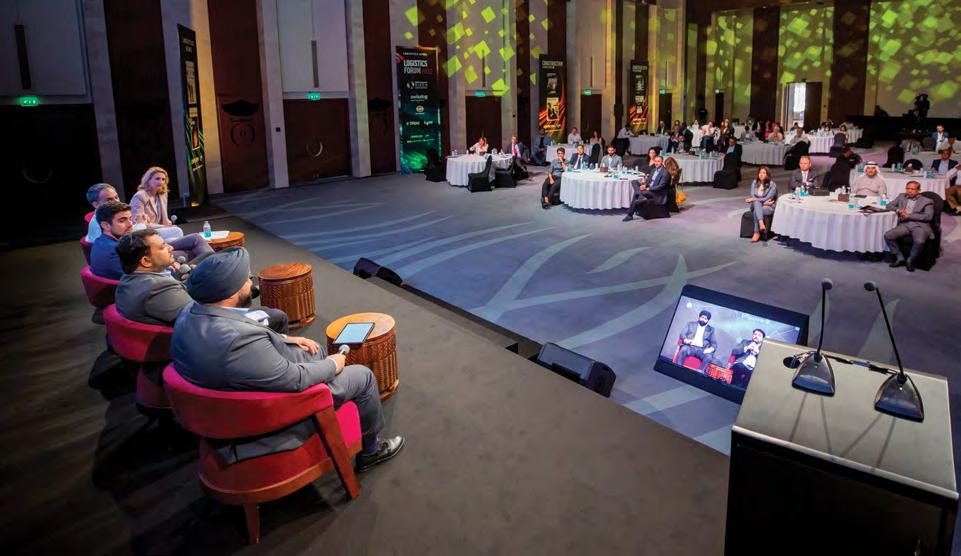
Carolin-Carmen Neubauer
COO & Co-Founder Fero.Ai
Karim Bakhache
VP Head of Strategy Lyve Global
Mohamed Reza
Vice President Shipsy “The pandemic put logistics under the spotlight, accelerating its fusion with technology – and forcing the logistics industry to catch up. Currently, it is impossible to meet customer demands, let alone provide an excellent customer service without the digitisation of logistics. With customer expectations rising, and competition compressing delivery time – technology is expected to bring accuracy and reliability into operations. Businesses that digitise their logistics experience the multiple benefits of increased visibility into their last-mile logistics. Their customers can easily track their order, access delivery status and ETA without having to reach out to customer service. Since the driver is at the core of operations, technology must be as user-friendly and straightforward as possible for them.”
KARIM BAKHACHE, VICE PRESIDENT STRATEGY, LYVE GLOBAL
“This is an exciting time for the supply chain and logistics industry as stakeholders rapidly realize the true potential of logistics transformation using modern technologies like AI, machine learning, predictive intelligence, blockchain, and more. AI is helping on-demand delivery providers, retailers, manufacturers, and logistics service providers build intelligent and self-governing logistics operations. For instance, it enables businesses to create highly efficient delivery routes, optimize capacity, enhance driver management, reduce carbon footprint, and drive costefficient selection of logistics partners. Then we have disruptive techs like predictive intelligence, helping logistics stakeholders build proactive supply chains by gaining critical insights into delays, exceptions, and emergencies. Blockchain will empower businesses and drive high levels of financial transparency and traceability. With demand for global trade skyrocketing, there is a need for supply chain stakeholders to ensure seamless B2B and international payments, and Blockchain will play a critical role here.”
MOHAMED REZA, VICE PRESIDENT, SHIPSY
PANEL 2 | WAREHOUSING IN THE SUPPLY CHAIN
Warehousing has progressed in the past few years by becoming more purposeful, sophisticated, accessible, and automated. And it will continue to further evolve to suit our requirements as technology advances. Warehouses are no longer just storage rooms; they offer multiple suites of functions to accommodate the various needs of the user.

“Warehouse automation has evolved in the past few years by becoming more strategic and necessary. Automating the warehouse is now a simple process and automated warehouses are environment friendly and sustainable. A word of advice to warehouse users is keep it uncomplicated, identify the obstacles and challenges in the operations, and ask the integrator to automate tasks. “As industry experts, we look forward to witnessing more high-bay automated warehouses to reduce operation costs and increase capacity, accuracy, productivity and safety.”
ATANAS KHAGERIAN, VP SALES (MIDDLE EAST & AFRICA), ACME
“Customer demand and expectations have evolved exponentially, and the region is catching up to implement technologies that can keep up with this demand. Delivery windows used to be one week or 10 days, now it’s down to an hour. Success is no longer measured by maximum capacity but rather by maximum fulfilment — maximising your velocity to the customer, delivering packages accurately and on time. “Therefore, the next evolution in warehouse automation technology is focused on increased standardisation to further reduce deployment times without compromising functionality. Automation helps with several operational issues such as achieving efficiency and productivity goals, dealing with stock-keeping unit proliferation, reducing errors and minimum dependence on human labour.”
DAVID DRONFIELD, GENERAL MANAGER, SWISSLOG MIDDLE EAST
“eCommerce is an area where we focus more on as we move into business-to-consumer (B2C), which puts more force on our warehouses and resources. This is where automation allows you to reduce the pressure by planning your volume better, managing deadlines and workforce, providing round-the-clock support, and preventing the cause of COVID-19 outbreak. “It is also closely associated with the Lean and CI methodologies we are applying across GAC Contract Logistics – Dubai business to ensure we offer our customers a lean supply chain. We are moving with the times. Companies struggle to keep their businesses running and plan significant strategic changes. Automation is making our supply chains far more flexible, agile, and localised as a complete end-to-end logistics solution, which will evolve further in the coming months and years.”
TREVOR STAMP, GENERAL MANAGER - CONTRACT LOGISTICS, GAC DUBAI
Atanas Khagerian
VP Sales (Middle East & Africa) Acme
Rami Younes
Chief Operating Officer ALS Logistic Solutions “The logistics and supply chain industries are changing at a rapid pace, and front-end customer portals and last-mile delivery will only be able to do so much. The data revolution is here, and it is front and centre in this industry. Customers’ expectations are exponentially changing, moving from multi-day delivery windows to two-hour deliveries and we are even seeing 20 minutes delivery times. We cannot forget that accuracy and efficiency are what make or break a deal. For that to happen successfully, companies need to invest in the right warehouse automation for their needs. “Warehouse automation has advanced to cope with these demands, modernising warehouses from endless aisles of static shelving and manual processes. The technology is there and improving all the time. From fully automated storage and retrieval systems, high throughput sortation systems, and guided picking modules, all managed intelligently with very advanced warehouse management systems.”
RAMI YOUNES, CHIEF OPERATING OFFICER, ALS LOGISTIC SOLUTIONS
David Dronfield
General Manager Swisslog Middle East
Trevor Stamp
General Manager, Contract Logistics GAC Dubai
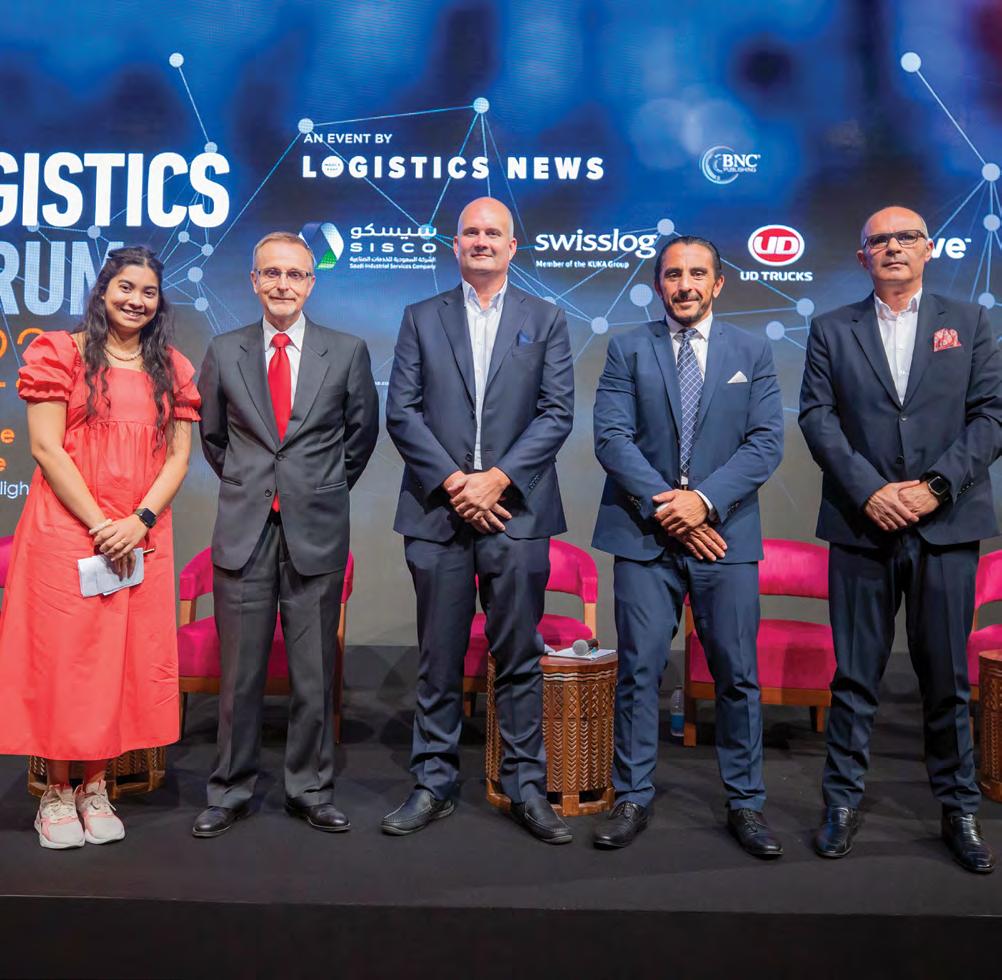
PANEL 3 | SUPPLY CHAIN WOES
While the pandemic was a catalyst that rattled the supply chain sector, experts are of the opinion that this was trouble in the making. Numerous factors contribute to this problem. But the shipping network shows no respite – supply chains continue to find itself in a logistics knot, ports face a never-seen-before congestion and shipping rates are yet to fall. What is the solution?
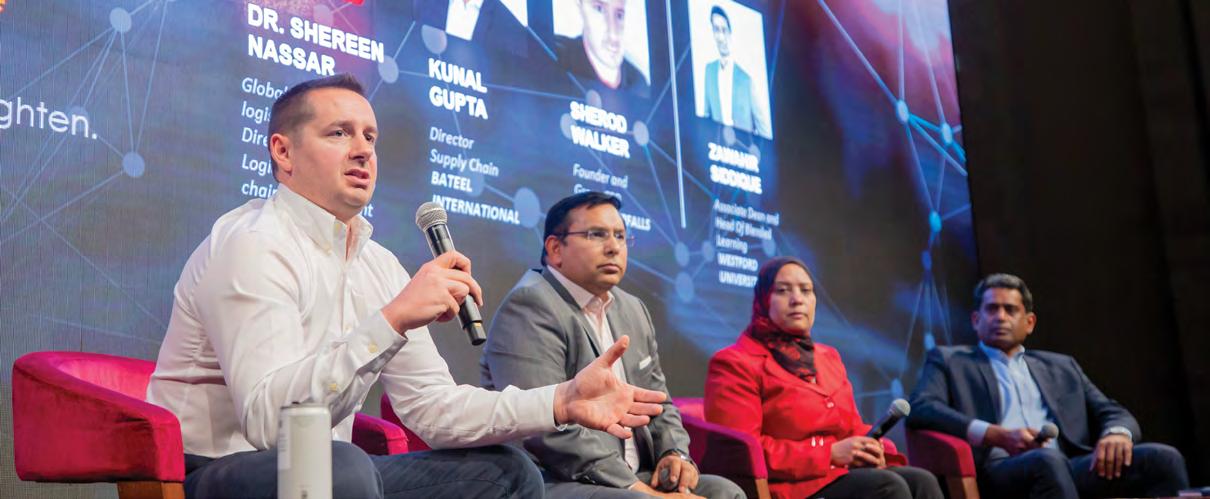
“Logistics and supply chain disruption is caused by factors internal and external to the supply chain. The trend towards globalisation augmented the impact of disruption on supply chains and businesses considering the knock-on effect which we clearly witnessed with the COVID-19 pandemic. “Due to the increase in the sources of disruption, managing supply chains becomes riskier considering the related impact on business performance, continuity, and growth. Disruption exposes the vulnerabilities of supply chains that are driven by certain practices including extreme lean and cost-cutting, global outsourcing, economies of scale, and single sourcing. This is augmented by the outdated IT infrastructure, lack of collaboration, and new business models. Current supply chain lacks flexibility, visibility, and responsiveness which are essential for resilience.”
DR SHEREEN NASSAR, GLOBAL DIRECTOR OF LOGISTICS STUDIES, HERIOT-WATT UNIVERSITY
“Disruptions to supply chain always happen when there is a misbalance between the demand and supply. When the pandemic hit us, there was a sudden drop in the demand, so it caused disruption. Last year, as we were coming out of the pandemic, there was a sudden spike in demand which caused even bigger disruption since there is simultaneously a shortage in the supply. Supply shortages are due to various reasons including port congestions, delay in shipping, vessel availability and geo-political reasons. “Some of the steps that can be taken to counter the disruptions are going local by having a combination of global and local sourcing, increasing dependence on local and regional products where possible, having agile supply chains, better planning, and digitisation.”
KUNAL GUPTA, DIRECTOR - SUPPLY CHAIN, BATEEL INTERNATIONAL
“The industry has been fractured since long before the COVID pandemic came to town. Let’s be honest, archaic practices, outdated infrastructure, and a lack of investment in certain areas has led to gaping holes that have, in effect, let water in and started to sink the ship. “In the Middle East we’re quite lucky. The pandemic has been handled well by governments, there’s an abundance of new infrastructure and a work force that are willing to get out of bed in the morning to put in more than a full day’s work. Dubai is what I would describe as a bouncy ball. The harder something drops in Dubai, the quicker and the higher it bounces. “Whilst technology can play a humble role in the road to recovery with new developments in AI and blockchain, it’s not a quick fix and still requires human oversight. Not one lifeboat is going to help the industry get back on the right track and it will take a combined effort together as an industry to bring her back up to full speed.”
SHEROD WALKER, FOUNDER & GROUP CEO, THE WATERFALLS GROUP
Dr. Shereen Nassar
Global Director of Logistics Studies Heriot-Watt University
Kunal Gupta
Director - Supply Chain Bateel International
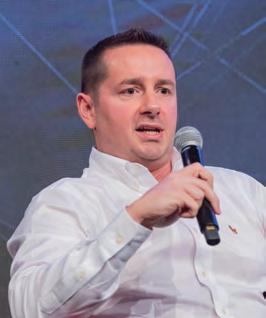
Sherod Walker
Founder & Group CEO The Waterfalls Group
Zawahir Siddique
Associate Dean and Head of Blended Learning Westford University College
“Supply chain management has grown over the years from a transactional unrecognized function to a key contributor to the boardrooms across the globe, establishing key alliances with strategic vendors and adopting largely disruptive technology that has transformed its very complex and unpredictable sourcing cycle. “Supply chain professionals of this century are required to procure intelligently and anticipate global disruptions beforehand. Negotiation skills and contract management knowledge is also crucial in bringing about product and service value to the end user. “Luckily, the advent of artificial intelligence platforms with the capability to provide 360-degree business intelligence, buyers and logisticians are provided with information on demand and sourcing capabilities that can advise professionals with an entire suite of information - from vendor compliance data to port congestion and container availability trends. “Machine learning, arguably a subfield of artificial intelligence has created the space for supply chains to shift to omni-channels, an integrated network that connects social media platforms that track consumer activities and consistently and asynchronously, support their demands. “Looking ahead, supply chain management will continue to be relevant even as it adopts the technological disruptors of today. Reducing carbon emissions and addressing return management due to increasing online transactions would also trigger a major paradigm shift in the supply chain domain globally.”
ZAWAHIR SIDDIQUE, ASSOCIATE DEAN AND HEAD OF BLENDED LEARNING, WESTFORD UNIVERSITY COLLEGE
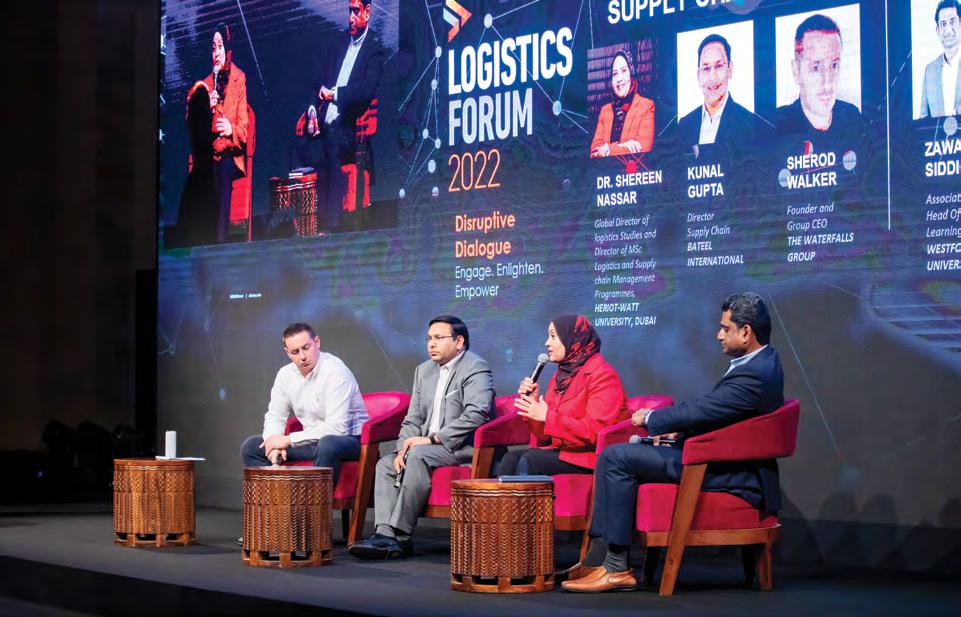
PANEL 4 | SUSTAINABLE MOBILITY
The logistics and transport sector are one of the largest contributors to carbon emissions on the planet. Are sustainable fuels, stricter emission standards, green infrastructure and fleet sharing the answers? What more can we do to lessen our carbon footprint?

“Transport emission have grown faster than those of any other sector over the past 50 years. And demand will continue to grow in the coming decades. There has been growing pressure from all stakeholders, both internally and externally to make positive and meaningful changes within the industry. “Recent accelerated growth in technological advances and innovation suggest a significant potential for such technologies to support sustainabilitybuilding efforts in maritime transport. To bring about meaningful change, it will take a collaborative effort from all parties. As a logistics provider, I have seen a growing interest from customers to mitigate CO2 where possible. And I believe that by introducing new and innovative solutions, optimising supply chains and implementing new technologies, this will give logistics service providers a tangible competitive advantage.”
AYMAN KABBARA, MANAGING DIRECTOR, SCAN GLOBAL LOGISTICS
“Environmental, social, and governance (ESG) criteria, which include sustainability, are crucial practices corporations need to implement. While most companies only implement ESG at board level and it doesn’t cascade down to operations. This is now changing, today businesses, especially logistics companies are taking sustainability seriously. For example, we, at SISCO, from 2021, included ESG compliance and participation in ESG programmes as a top priority for every department. Employee performance appraisal are also based on ESG and participation in ESG related programmes. This affects their annual bonus and incentives. “Such initiatives are necessary to ensure we make sustainability a priority not only in our businesses but in our lives too. Sustainability must be a part of our culture and must be driven top to bottom, that’s the only way it can succeed and yield some benefit to the organisation, the market and society.”
MOHAMMED AL-MUDARRES, CEO, SAUDI INDUSTRIAL SERVICES CO.
“Logistic is vital for society and it is very important that it is sustainable. Within UD, we see sustainability with the big picture and not in one specific area. As key player in logistics, we want to be a Japanese leader in sustainability addressing the four sectors: environment, customer satisfaction, employees, and performance. “We see an urgent need to improve efficiency as trucks are still not used with full capacity and this is very important for the sustainability of our customer business. When it comes to the environment, we see multiple opportunities in the short- to mid-term: improving efficiency of the driveline and reducing fuel consumption will directly improve CO2 emissions. “For the mid- to long-term, electric battery vehicles would be an alternative for city distribution and short-range applications. Electric fuel cells with hydrogen would be the substitute for long haul/long range applications. E-fuels may be used on lower scale for some applications with internal combustion engines.>>>
Ayman Kabbara
Managing Director Scan Global Logistics
Mohammed Al-Mudarres
CEO Saudi Industrial Services Co.
Mourad Hedna
President UD Trucks MEENA
Rob Mortimer
Founder & Co-owner BOOSTplus Biofuel
>>> “Ultimately, we all need to adhere to this sustainability journey, and we need to work jointly cross industries and between competitors to make a difference as this is a problem for the society as a whole.”
MOURAD HEDNA, PRESIDENT, UD TRUCKS MEENA
“It was lovely moderating a session on sustainability. We lead the discussion with a focus on what can and is being done right now to reduce emissions, fuel consumption and wastage in the logistics industry and what part technology can play in meeting the corporate and governmental goals being set. The questions being asked all over the world, how many of the initiatives being announced to the global market are just marketing soundbites from large enterprises who benefit commercially from their ESG positioning over smaller companies’ versus how much real action and work to reduce emissions filters down into the operations and whether there is much effort into calculating, verifying, and policing the sometimes over communicated promises. “There appears to be a convenience with making long term ESG statements of NetZero by 2030, but in most cases the actions for getting there don’t appear to match the marketing statements. One of the significant positives we have taken away from the presentations and panel discussions is that technology and digitalisation are driving efficiency, which in turn cut costs, delays, and emissions.”
ROB MORTIMER, FOUNDER & CO-OWNER, BOOSTPLUS BIOFUEL
